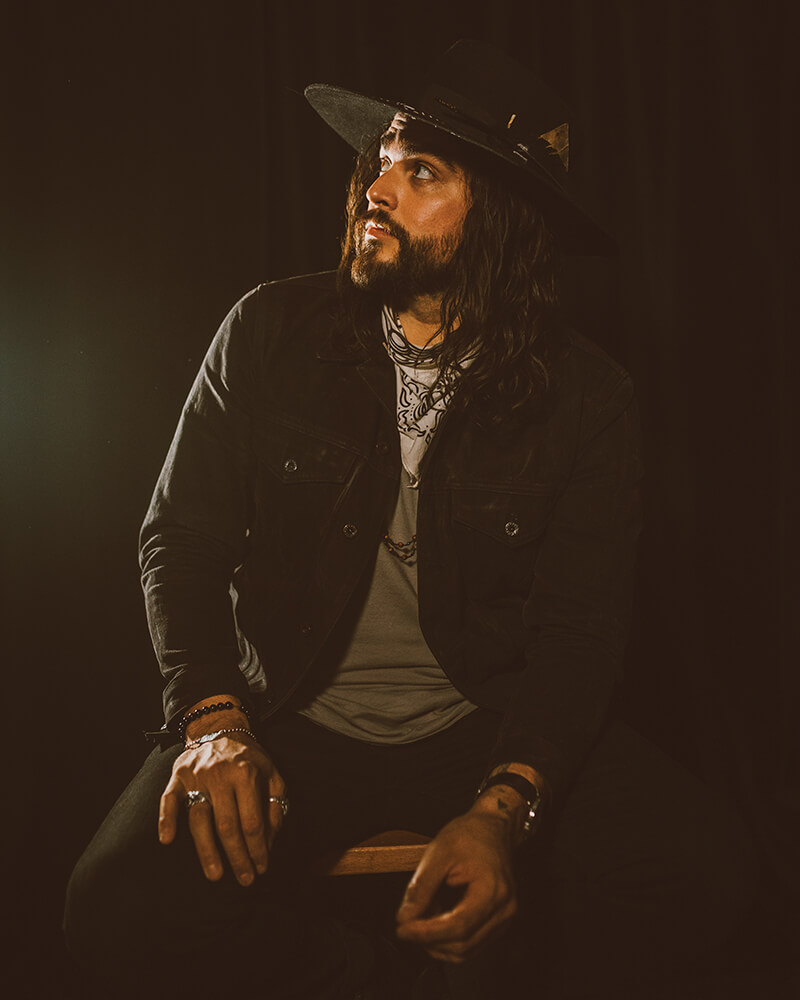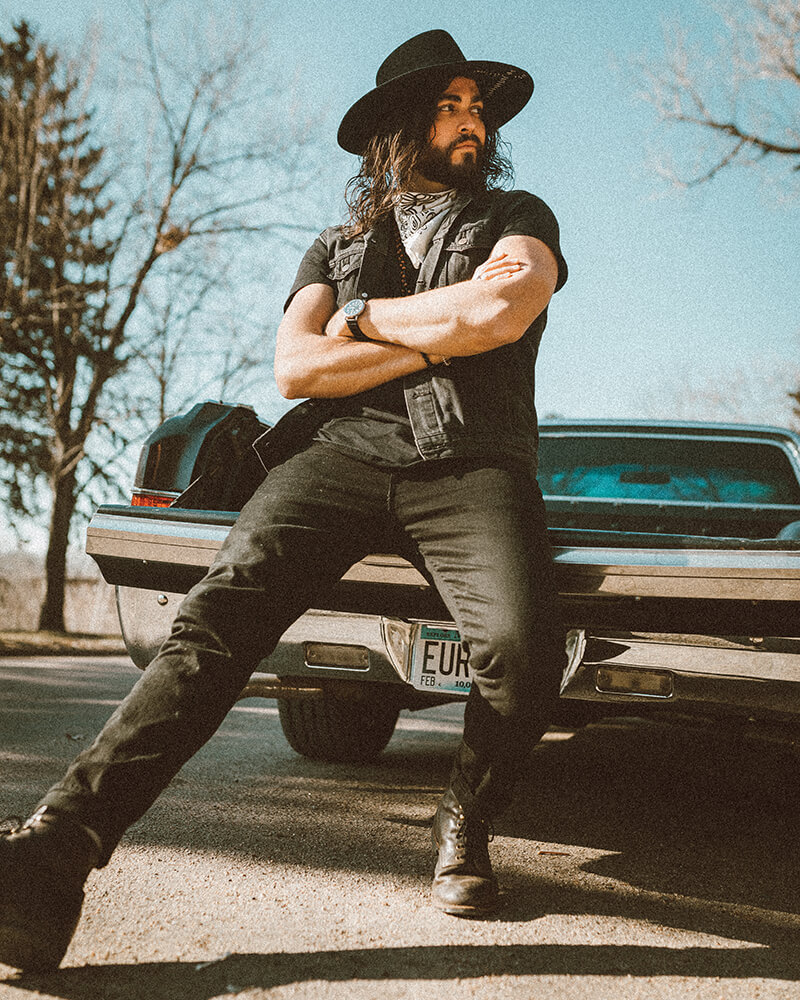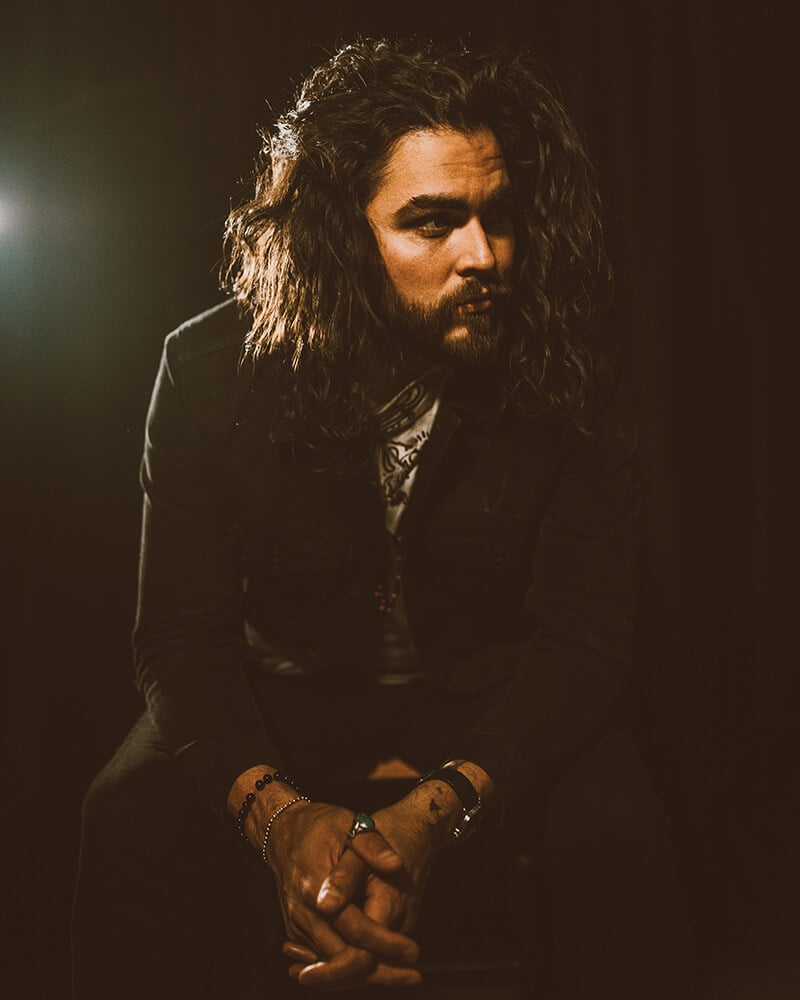We first met Dan Rodriguez when we selected him to be our recent Elixir Strings artist of the month. We had been keeping tabs on him via his Instagram profile for a few months, and he sincerely impressed us with his authenticity, the honesty that his music conveyed, and most obviously: his sheer talent both as a guitarist and a powerhouse vocalist.
So, we decided to learn more about the man behind the beard, and thus it begins…
Let’s talk about how you got started – what’s your earliest memory of picking up an instrument or sparking the creative interest?
I played music my whole life; I grew up in a very musical household. For the most part, we were homeschooled and part of that was my folks said all the kids had to be in music lessons. So, I started on the violin and my brother was proficient on piano at a very young age. They used words like “prodigy” a lot around the house, you know? [laughs]
He is, to this day, the best musician I’ve ever worked with.
Do you still play with him?
Oh yeah, he’s in my band and we’ve done a million projects together. He runs a music school, as well. I wasn’t nearly as good at piano as my brother. I remember being like, “I’ll never be like that, so why even try?” [laughs]
I picked up a pair of drumsticks at age 11, I started taking lessons and playing drums in church. I thought I was going to be a drummer, I wanted to be Travis Barker so bad. I practiced all the time and bought a drum kit for $50, and I was on cloud nine. My folks let me have it in the house, so I played in the basement all the time.

Then, my brother got a guitar when I was 15. And every time he left the house, I’d sneak in his room, unclasp the case, play it, polish it up when I was done and put it away – he had no clue!
That’s when I knew I wanted to get my own. I was weeding gardens in the neighborhood to buy that [first] guitar.
What did you get?
It was a Guild Starfire special. [at this point, Dan pulls out the guitar on our Zoom call and proceeds to show it off and play it a bit]. It’s a beautiful guitar and sounds great. So many people were like, ‘get a Strat, get a Tele,’ but I’m always one of those people who kinda likes to go against the grain.
I had that punk mentality, well at least a little bit. As much as you can being a suburban, mostly-white kid… [laughs]
As punk as you can, I suppose.
Yeah, totally. ‘I’m gonna be super punk and get a hollowbody!’ I wanted something different – little did I know that single coil pickup was going to be something I dug and that set me apart.

So, you play drums, you sneak in to play guitar and then get your own. Do drums fall to the wayside?
No, I still play drums. I played drums in bands and things in Minneapolis. There was a band with the most recognition called Four on the Floor, everyone had kick drums and every song was literally four-on-the-floor.
When does songwriting enter the picture for you?
That really comes in when I’m about 15, when I’m stealing my brother’s guitar. Just to get real deep real fast, we had a little brother that passed away. I was tinkering with the guitar and I wrote my first song processing my emotions while I was dealing with that.
What ended up happening was…it left me. Those emotions came out, and I was able to release it into the song and put it out into the world. In figuring out, at that young an age, a way of therapy for myself… that was huge. And discovering that was the beginning of me going, ‘I can take all the things in my heart, put them in a song, and not only that, but I can say it better in a song. It hits heavier and it means more.’
When you’re on stage and there’s 300 people in the room – you’ve got 301 interpretations of that song happening at one time. Every single listener who’s tuned in and engaged, hearing me tell my story. But they’re sitting there in the crowd, connecting their story to it and figuring out how my story connects to theirs. They’re interpreting it differently, and it means something different to each person.
So, you could have one song that means something to me, but when I play it for those 300 people, it means hundreds of other things I couldn’t have imagined and there’s something really special about that.
That’s when we start tapping into doing something bigger than ourselves. The songs that make you dance and tap your feet, that don’t lyrically mean anything? They have a purpose. Those songs matter so much, too – but that’s a different type of release.
But the ‘heart songs’ that really connect with people. Those are the ones where I feel like I’m living in my purpose. I see how I’m connecting with other people.
And you never know who’s out there amongst those 300 people. Someone could have just lost a job, broke up with their girlfriend, or lost a loved one that week…
Exactly. A great example is I have a song called ‘Until The End,’ which is an open letter to my kids. I sang that song so much, and I’ve had people come up to me after shows to say, ‘I just lost my dad and hearing that song and knowing they’re watching over me means so much.’ But I wrote that song from the perspective of the parent. You know? And they’re processing it and hearing it from the perspective of the child [that’s being sung to].

It’s really interesting how that happens, and it means so much to know people take the time to put their own meaning on a thing you wrote and put your heart into.
You never know how people will attribute meaning to what you’ve written. That’s just how art works. You had mentioned earlier you actually went to school for music, but it didn’t really pan out for you. Do you think if you had gone to a bigger program, like Berklee, things would have turned out differently?
If I were going to school today, I’d put the time in and value it. I was so insecure and arrogant back then, but in the end, I was unwilling to put in the work. I was young and dumb and not putting the work in. I was willing to put in the work when I got the reward right away, and for things I was excited about.
But I wasn’t willing to put in the [effort] for the hard stuff. I failed music theory. [laughs hard] Even today, I lean on my brother when we’re in recording sessions or rehearsals, like ‘That’s a 13th, right?’
I had to go back and re-learn things I was taught and didn’t absorb. But I had every desire to do music full time and to do whatever it took to make that happen.
So, I did music in church as a worship leader. Which sounds like a nightmare to me right now…but for me, I look at it and go, ‘That’s not my dream.’ But I did do it to have income. So, I did the barista and church music thing for a while [to make ends meet].
And I got a job working at a non-profit where we’d go into schools and talk to kids about how to treat each other better. And they needed musicians, so I’d write songs and it would be me and a microphone in front of a few hundred kids and we wrangled this whole crowd for hours. That program was amazing, and one thing I learned was how to get comfortable in front of, and wrangle people.
So, you were working on your future stage presence without even knowing it?
I got so comfortable on a microphone. If you can get kids eating out of the palm of your hand…for 10 years I was in front of a m microphone with these kids. And I learned adults are just boring kids. And so, that side of my show is, I think, something that stemmed from 10 years learning how to be comfortable in front of people. And even when I didn’t know what I was doing, and I was losing [the kids], learning how to [push] ahead was invaluable. I learned so much from those people [at the non-profit] that I carry with me to this day.
Let’s talk about your writing process, what’s your creative headspace look like?
I used to say that if I wasn’t writing songs, I had writer’s block. And all these other excuses. And that may really happen to folks. But to me personally, that’s all BS. And that’s just for me. I don’t think writer’s block exists.
I think laziness exists for me. So, if I go, ‘I’ve got writer’s block,’ it’s usually because it didn’t come easy. Or I didn’t put in the work. Songwriting is like a muscle, and just like any muscle in your body, the more you work it out the stronger it’s gonna get. The more you try to push it without stretching and [build] a slow progression of growth, you’re gonna hurt yourself or give up.
For me, realizing that was the biggest challenge. You’ve just got to put the work in. But it’s work you enjoy.
Follow on Instagram @danrodriguezmusic
Photos by Jake Dixon
